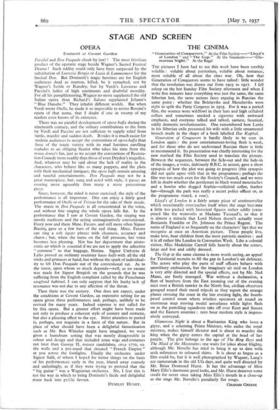THE CINEMA
"Generation of Conquerors." At the Film Society—" Lloyd's
of London" and "The Gap." At the Gaumon: "Gla- morous Night." At the Regal THE pictures I have had to see this week have been terribly voluble : voluble about patriotism, voluble about romance,
most voluble of all about the class war. Oh, how that Generation of Conquerors seems to have talked : little wonder that the revolution was drawn out from 1905 to 5917. I fell asleep on the hot Sunday Film Society afternoon and when I woke five minutes later everything was just the same, the same Siberian hut, the same serious faces arguing in Russian the same point : whether the Bolsheviks and Mensheviks were right to split the Party Congress in 1903. For it was a period film, the women wore wildfowl in their hats and high celluloid
collars and sometimes smoked a cigarette with awkward emphasis, and everyone talked and talked, earnest, fanatical, oddly domestic revolutionaries. One remembered how Lenin in his Siberian exile presented his wife with a little ornamental brooch made in the shape of a book labelled Das KapitaL Generation of Conquerors is hardly likely to be seen in London again : the poor entertainment-loving flesh is weak,
and for those who do not understand Russian there is little to recommend it. Its presentation was chiefly interesting for the new method the Film Society used to translate the picture.
Betwecn the sequences, between the fade-out and the fade-in of the images, a voice, dubiously B.B.C. in accent, gave a short synopsis of how the plot was going to progress (this synopsis did not quite agree with that in the programme; perhaps the film was too much even for the Society's Council, and we were left in doubt whether the gentleman in black waxed moustaches
and a bowler who dogged Sophia—celluloid collar, feather hat—through the park was really a secret police officer or, as the programme stated, a roué).
Lloyd's of London is a fairly astute piece of sentimentality which occasionally overreaches itself when the stage becc mes a little too packed with historical figures rather oddly juxta- posed like the waxworks at Madame Tussaud's, so that it
is almost a miracle that Lord Nelson doesn't actually meet Benjamin Franklin or Dr. Johnson the Prince Regent. The name of England is so frequently on the characters' lips that we recognise at once an American picture. These people live, make love, bear children from the most patriotic motives : and it is all rather like London in Coronation Week. Like a colonial visitor, Miss Madeleine Carroll falls heavily about the screen, large and lost and oddly dressed.
The Gap at the same cinema is more worth seeing, an appeal for Territorial recruits to fill the gap in London's air defences.
The actors who play the parts of staff officers behave with unmilitary enthusiasm, but the imaginary air raid on London is very ably directed and the special effects, not by Mr. Ned Mann, are finely managed. War without a declaration, a fleet of bombers from the East zooming out of the evening mist over a British trawler in the North Sea, civilian observers grouped round their metal tripods as they report the strange planes crossing the coast in the late evening light, the bomb- proof control room where wireless operators sit round an enormous map moving model aeroplanes while lights flash on as the patrolling squadrons take off over Kent and Sussex and the Eastern counties : zero hour modern style is impres- sively conveyed.
Glamorous Night is about a Ruritanian King who loves a gipsy, and a scheming Prime Minister, who exiles the royal mistress, makes himself dictator and is about to murder the king when the gipsy enters the capital at the head of her people. The plot belongs to the age of The Bing Boys and The Maid of the Mountains; one waits for jokes about blighty, although Mr. Novell° has tried to bring it up to date with
arch references to coloured shirts. It is about as bogus as a film could be, but it is well photographed by Wagner, Lang's ace cameraman in the old Ufa days, and quite well directed by Mr. Brian Desmond Hurst. It has the advantage of Miss Mary Ellis's daemonic good looks, and Mr. Hurst deserves some credit for never once taking Miss Ellis's mouth in a close-up as she sings Mr. Novello's peculiarly flat songs.
GRAHAM GREENE














































 Previous page
Previous page